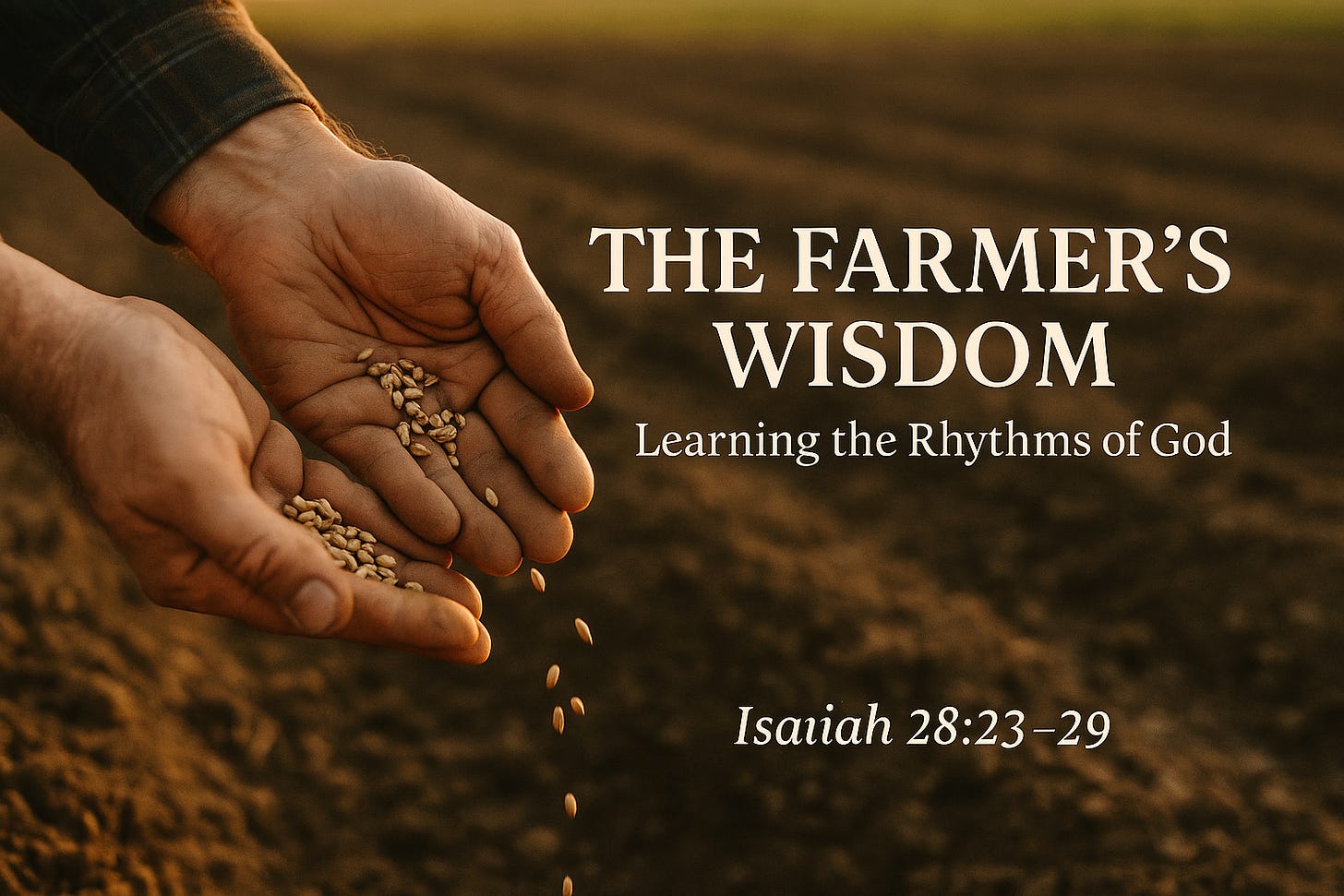The Farmer’s Wisdom: Learning the Rhythms of God
Thoughts from my morning devotion with God
“Listen to me; listen, and pay close attention.” — Isaiah 28:23
Isaiah 28:23-29…
The prophet begins not with a command to work but to listen. God’s classroom is the field, His curriculum written in furrows and seed, His pedagogy embedded in the rhythm of soil and season. If you want to know how God moves, Isaiah says, watch a farmer.
A farmer doesn’t just plow. He knows when to stop tearing up the soil and start sowing seed. He plants black cumin, cumin, wheat, and barley—each in its proper place, each at the right time, each handled with the right touch. He doesn’t thresh cumin with a heavy sledge or crush wheat to dust. His work is measured, mindful, and rooted in wisdom given by God.
That’s what Isaiah calls divine pedagogy: “For God has given him understanding” (v. 26).
Creation becomes the seminary of the soul.
🌱 The First Lesson: Execution, Not Just Intention
The farmer doesn’t live in a perpetual “planning meeting.” He moves from plowing to planting. He executes.
I wrote in my notes: “He doesn’t start and not finish. He completes the work!”
There’s a semiotic brilliance in that. Plowing without planting is the spiritual equivalent of always preparing but never doing. God’s people can become addicted to the preparation—forever turning over the same soil of possibility, but never releasing the seed of obedience.
The gospel isn’t theory. It’s seed. Until it leaves your hand, it can’t take root.
🌾 The Second Lesson: Precision in Planting
Each seed is placed “in its proper way and in its proper place.”
This is not random scattering. It’s intentionality—specificity married to wisdom. The farmer knows the seed. He understands what it needs to grow.
I wrote: “He understands each seed and what it needs to grow; he plants with purposeful attention.”
God’s wisdom is like that. He doesn’t plant all people in the same soil. Your field may not look like mine. Your calling may need a different depth, a different rhythm of rain. What seems like delay in one field may be divine timing in another.
This is a quiet rebuke to our culture of comparison. God doesn’t plant all His seeds at once or in the same way. Your season isn’t their season.
🌾 The Third Lesson: Intention in Harvest
“He threshes it under the wheels of a cart, but he doesn’t pulverize it.”
There’s artistry here. The farmer knows that too much pressure destroys the harvest. Too much intensity crushes what should be preserved. In leadership, in parenting, in ministry—force can ruin what patience can ripen.
I wrote: “He harvests with intention… according to its nature.”
God knows the texture of every soul He tends. He disciplines without destroying. He shapes without shattering. There’s a tenderness in His touch that mirrors the farmer’s careful hand with cumin and wheat.
If we would be co-laborers with Him, we must learn His rhythms of restraint. Wisdom is not doing everything possible, but everything appropriate.
🌾 The Divine Semiotic
Isaiah’s farmer is more than a metaphor. He’s a signpost to the Teacher Himself:
“The LORD of Heaven’s Armies is a wonderful teacher, and He gives the farmer great wisdom.”
God is not distant from the field. He’s the first farmer, teaching through seasons, soil, and seed. Every plow furrow is a parable; every harvest a homily.
To listen to God is to read the world as His text—soil as scripture, seasons as syntax, and fruit as punctuation.
🌾 The Application: Rhythms of Grace
I summarized the text this way: “Just as there is a time and place and action for everything, God knows the time and place and action to take.”
God’s governance is not haphazard. The same wisdom that teaches a farmer when to plant teaches us when to act, when to wait, and when to rest.
In the classroom of creation, timing is everything.
To ignore that rhythm is to court disaster.
“There are principles you follow and some you don’t. If you flout the principles, disaster erupts.”
There are divine cadences embedded in the soil of existence—laws of grace, timing, and proportion. To live wisely is to attune yourself to them.
🌾 The Closing Benediction
God’s field is still alive with meaning.
He still speaks through soil.
He still teaches through timing.
He still whispers through the wind in the wheat.
So, listen.
Not with ears alone, but with attention.
Watch how God works—in creation, in your life, in the lives of others.
For the same hand that teaches the farmer to sow and reap is shaping the seasons of your soul.
He is beautiful and amazing.
And He is perfect.


